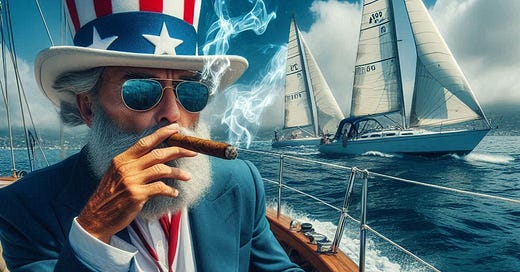He Liked Cheap Cigars. So They Took His Boat Away
The Farcical Case of USA Versus Jeff Southworth
Not too long ago, Loose Cannon published a series of stories written by a wannabee sailor about his maiden voyage. Let’s just say his suffering was palpable, described in the hyperbolic style of humorist Dave Barry.
Funny guy Frank Genao had been volunteer crew on the Janice Ann, a Catalina 470 owned by one Jeffrey Southworth, the protagonist of today’s …
Keep reading with a 7-day free trial
Subscribe to LOOSE CANNON to keep reading this post and get 7 days of free access to the full post archives.



